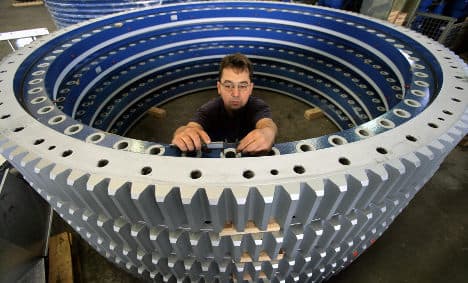Industrial orders jump 5.2 percent

German industrial orders surged by a surprise 5.2 percent in November from the level in October, provisional data showed on Thursday, a sign Europe's largest economy should remain robust in coming months.
The performance reinforced the importance of Germany's export-orientated industry within the EU and eurozone economies.
Analysts polled by Dow Jones Newswires had forecast a monthly increase of
1.0 percent following a rise of 1.6 percent in October, but the figures also revealed a continued and worrying slump in orders from other eurozone members.
A breakdown of the Economy Ministry data indicated that most of the demand came from abroad, with an increase of 8.2 percent, while domestic orders gained a more modest 1.5 percent.
Large orders from abroad for investment goods such as machine tools showed a rise of 9.1 percent as expanding activity in Asia and the Middle East boosted demand for German goods.
The Economy Ministry welcomed the result and took pains to underscore that the result was not only the result of large orders.
"The industrial sector is beginning the year with a good order book," a statement said.
ING senior economist Carsten Brzeski noted that "German companies had already piled up enough backlogs to keep production running smoothly throughout 2011 and the continuing inflow of new orders could even create production bottlenecks in the coming months."
But demand from eurozone partners declined by 1.4 percent, which could suggest the now 17-nation bloc is headed for a two or three-speed recovery.
Core countries such as France and Germany appear set for solid growth this year while others could stagnate or even slip back as austerity measures take effect and consumption is curtailed.
On a sliding two-month basis, eurozone orders fell by 8.5 percent in October and November compared with August and September.
The German central bank has forecast growth of 2.0 percent in 2011, with unemployment expected to decline further and business investment tipped to profit from ultra low interest rates.
In Brussels meanwhile, a key European Union indicator showed that confidence in the entire crisis-hit eurozone rose in December, pulled by strong readings in France and Germany.
AFP/mry
Comments
See Also
The performance reinforced the importance of Germany's export-orientated industry within the EU and eurozone economies.
Analysts polled by Dow Jones Newswires had forecast a monthly increase of
1.0 percent following a rise of 1.6 percent in October, but the figures also revealed a continued and worrying slump in orders from other eurozone members.
A breakdown of the Economy Ministry data indicated that most of the demand came from abroad, with an increase of 8.2 percent, while domestic orders gained a more modest 1.5 percent.
Large orders from abroad for investment goods such as machine tools showed a rise of 9.1 percent as expanding activity in Asia and the Middle East boosted demand for German goods.
The Economy Ministry welcomed the result and took pains to underscore that the result was not only the result of large orders.
"The industrial sector is beginning the year with a good order book," a statement said.
ING senior economist Carsten Brzeski noted that "German companies had already piled up enough backlogs to keep production running smoothly throughout 2011 and the continuing inflow of new orders could even create production bottlenecks in the coming months."
But demand from eurozone partners declined by 1.4 percent, which could suggest the now 17-nation bloc is headed for a two or three-speed recovery.
Core countries such as France and Germany appear set for solid growth this year while others could stagnate or even slip back as austerity measures take effect and consumption is curtailed.
On a sliding two-month basis, eurozone orders fell by 8.5 percent in October and November compared with August and September.
The German central bank has forecast growth of 2.0 percent in 2011, with unemployment expected to decline further and business investment tipped to profit from ultra low interest rates.
In Brussels meanwhile, a key European Union indicator showed that confidence in the entire crisis-hit eurozone rose in December, pulled by strong readings in France and Germany.
AFP/mry
Join the conversation in our comments section below. Share your own views and experience and if you have a question or suggestion for our journalists then email us at [email protected].
Please keep comments civil, constructive and on topic – and make sure to read our terms of use before getting involved.
Please log in here to leave a comment.